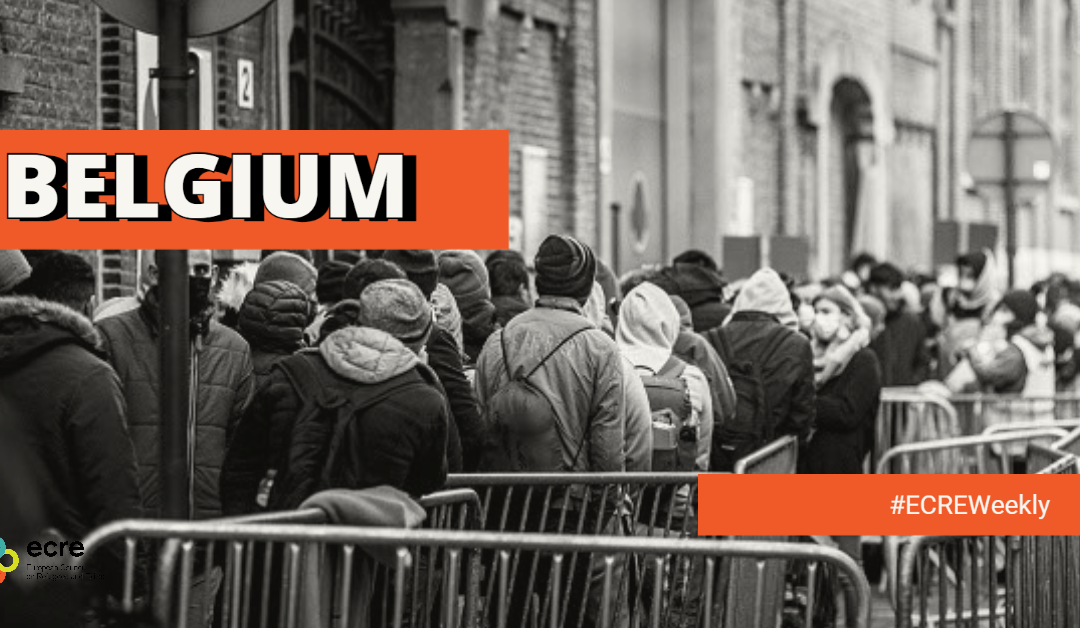As the reception crisis continue Belgian authorities continue to ignore convictions over failures to provide accommodation. The evacuation of the unsafe and unhygienic squat in Paleizenstraat leaves NGOs unimpressed as thousands of asylum seekers remain in the street.
The ongoing reception crisis in the Belgian capital of Brussels continues. Thomas Willekens from ECRE member, Vluchtelingenwerk Vlaanderen (Flemish Refugee Action) reported on 6 February of yet another conviction of the asylum agency. According to Willekens: “This ruling once again shows that Fedasil – and consequently the Secretary of State – ignore the right to reception, and do not seem to attach any value to the other legal rulings. This is already the Agency’s fourth conviction in the class action”. In a statement to ECRE he outlines the legal developments related to the case. Fedasil was convicted for non-respect of the right to reception on 19 January with a fine of 5000 Euro per day that it failed to respect the judgment. However, Fedasil neither respected the judgment nor paid the fines. Flemish Refugee Action therefore returned to the court of first instance along with nine other NGOs requesting an increase of the fine which was granted by the court setting it at €10.000 per day. Further, attempting to claim fines for non-respect of the right to reception left unpaid by Fedasil throughout 2022, Flemish Refugee Action along with fellow NGOs went before the juge the saisie and with the help of a bailiff compiled a list of goods that could be claimed as compensation for these fines. The goods identified will be sold on a public auction, and the income of this auction will then be transferred to Flemish Refugee Action and nine other NGO’s, among the claimants to continue their work in support of asylum seekers. As of late January 2023 the agency had been convicted and fined by the Labour Court more than 6,000 times for failing to provide accommodation to asylum seekers.
Meanwhile, almost 1000 people – the vast majority asylum seekers left without accommodation – have been sleeping in a squat in Paleizenstraat in Schaarbeek under unhygienic and unsafe conditions. Yassin and Riazullah both asylum seekers and residents at the squat told media on 13 February: “I sometimes go upstairs. You know, there are a lot of people here who are thieves, who sell drugs. It’s quite dangerous, there is blood” and “Yesterday they fought here and some people got hurt. You see the blood. It’s not secure enough. Every night there’s a fight and that’s a problem”. On the night of 15 February – the day an evacuation announced by authorities began – media reported of a death at the squat, and reportedly: “A pathologist has attended the scene. Prosecutors are yet to comment on the exact circumstances of the death”. NGOs were not impressed with the evacuation. “It’s dreadful that somebody died in the Paleizenstraat. Alas, for us this is no surprise. Yesterday we saw total chaos as a result on a failure to co-ordinate policy. We are seeing it again today. We fear for a repeat of this tragedy as long as the situation of people without accommodation remains desperate”, said Flemish Refugee Action. “The evacuation can be summarized as: chaotic and inadequate. Some people have been on the street since this morning without knowing where to go”, stated Doctors of the World Belgium. Willekens from Flemish Refugee Action defined the evacuation effort as: “Too little too late”, pointing out that not all residents have received shelter and stating: “We are concerned about the 3,000 asylum seekers who are entitled to reception, but who still have to sleep on the street”. Reportedly, some of the former residents of the squat in Paleizenstraat have been taken to hotels however without the Brussels region informing local municipalities and with limited alternative accommodation people were left in the streets, in other squats or cramped in tents outside the Petit-Château reception centre. “The problem has moved, but it hasn’t been solved,” said journalist Marjan Temmerman.
ECRE member, Jesuit Refugee Service (JRS) Europe has put the spotlight on flaws in the detention system in Belgium. According to the organisation the current legislation and practice in Belgium fail to protect vulnerable people: “Upon arrival in detention, the law only provides for a medical exam. This is not sufficient to identify non-medical vulnerabilities. The immigration office could decide not to detain someone based on other considerations. But in practice, only the likelihood of return is considered for a detention order, except for +24 weeks pregnant women and children. Also, when reviewing detention orders, judges are only allowed to assess their legality and cannot consider vulnerability”. JRS recommends: “The law should be changed to allow judges to look beyond the legality of detention so that they can take into account the
vulnerability of a person while reviewing their detention” and urges that: “A clear legal framework that identifies vulnerability and spells out the consequences in relation to detention should be established. To start, the current internal rules of ‘extra care and attention’ could be made public and translated into legislative acts”.
For further information:
- ECRE, Belgium: Failure to Deal with Persistent Reception Crisis is “Attack on Rule of Law” Human Rights Institutions Say, Situation in the Building of Palais des Droits is “Worse than that in Libya’s Camps” Underline NGOs As Authorities Find No Solution, January 2023
- ECRE, Belgium: Refugees Enduring “Unacceptable, Inhumane & Degrading” Conditions as Reception Crisis Continues, De Moor Blames Lack of Reception Facilities on “Disproportionate Influx”, ECtHR Applies Another Interim Measure on Right to Reception, November 2022
This article appeared in the ECRE Weekly Bulletin. You can subscribe to the Weekly Bulletin here.

